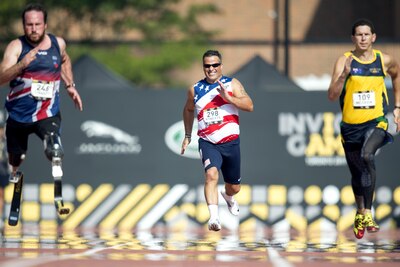By Shannon Collins DoD News, Defense Media Activity
TORONTO, Sept. 27, 2017 — Though Patrick Roberts has earned
more than 40 medals over the years while competing at the Department of Defense
Warrior Games, the medals he earns at this year’s Invictus Games here will mean
more, he said, because they are dedicated to his twin brother, Tim Roberts, and
his late father, Jim Roberts.
Around the time Roberts was medically retired from the Air
Force as a technical sergeant in 2008, his brother drowned. Roberts had served
16 years as a tactical air controller, calling in close air support missions
for the Army on Special Forces missions in Haiti, Bosnia, Kosovo and
Afghanistan. While in Afghanistan, he sustained multiple injuries during combat
operations. After 18 surgeries, he medically retired. He also has
post-traumatic stress disorder and a traumatic brain injury.
Roberts’ father, who was a major influence in his life,
passed away a little over a month ago. “My dad, I love him. He definitely
inspired me and my twin brother. He pushed us since we were five years old. He
was very big into sports, mostly wrestling,” Roberts said with emotion. “You’re
going to win no matter what. I’m trying my hardest. You always push as hard as
you can but it’s a special effort for him.”
He said his father was a four-time state wrestling champion
and a national champion. His grandfather wrestled in the Olympics.
Roberts earned a bronze medal in his disability category in
the men’s 100-meter and 200-meter at track and field Sept. 24 at the York-Lions
Stadium. He competes this week in track and field, swimming and seated
volleyball.
“This is my first Invictus ever, and I’m excited,” he said.
“I’m going to be 45 [years old] this year but it’s still fun to come out and
beat some of these young kids. I’m going to go back home, work harder, lose
some weight and try out for Team Socom for the Warrior Games and for the next
Invictus Games.”
More than 550 wounded, ill and injured service members from
17 nations compete in 12 sporting events including archery, track and field,
cycling, golf, sitting volleyball, swimming, wheelchair rugby and wheelchair
basketball Sept. 23-30 as they are cheered on by thousands of family members,
friends and spectators in the Distillery District here.
Road to Recovery
The road to Invictus was a journey, he said. “Even though I
never wanted to join, I loved the military. Once you’re in a career field like
that, it’s like a brotherhood; it’s your life,” he said. Roberts said as he
transitioning out of the military and dealing with the loss of his brother and
his fellow comrades, he was also dealing with the pain of his injuries.
“They gave me a lot of pain meds. It was horrible, and I was
in a bad place,” he said. “They were like, you’re not going to walk again. I
was in a wheelchair. I told them, ‘No, I’m going to walk again. I’m going to
run. I’m going to quit the meds.’”
He checked himself into a rehab facility and worked his way
off of the pain medication. “If I hadn’t gone to the rehab facility, I probably
wouldn’t be here today,” he said.
Adaptive Sports
Roberts said getting out and meeting up with other veterans
who had similar backgrounds helps, as well as finding adaptive sports in local
areas. “Life can suck but you can manage it better by getting with other vets
who have been through what you’ve been through or who you can relate to,” he
said. “I try to get out there and help people.”
Roberts speaks to police departments and has been a speaker
at the FBI Academy. “I tell them, we all need help. We don’t want to talk about
it, especially the guys in Special Ops. We never need help but you have to get
help because you don’t want to be like some of my friends who have committed
suicide. They never got help. They never got the proper treatment. I know it’s
hard. These programs here motivate me. I’m in pain but I’m out there living it.
Just take one day at a time,” he said.
Roberts said the key is to get out of the house and get
involved. “Do it once, and you’re going to see that you enjoy it. You’ll
continuously start coming back and that right there should inspire you and
start changing your life,” he said. “People get out of the military and feel
depressed or left out. It only takes time to change your life. Don’t worry
about making a team. Just get involved. Get engaged, have a good time, and
you’re going to find out that life does get easier.”








No comments:
Post a Comment